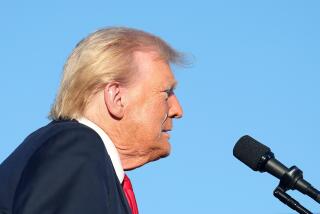Afghan Group Denies Plotting Assassinations
- Share via
KABUL, Afghanistan — Members of a group targeted in a swarm of arrests here stemming from an alleged assassination conspiracy denied any plot Saturday and said those seized were involved in legitimate political activity.
The leader of a branch of the Hezb-i-Islami party said hundreds of innocent people were rounded up in a dawn raid at his compound last week.
“If the authorities had any problems with our party, they should declare at the beginning that we cannot engage in any political activities,” said the leader, Wahidullah Sabaun.
Sabaun appeared to be under a loose form of house arrest. In the days since the arrests, intelligence agents have been slouching outside Sabaun’s compound. The agents, still present Saturday, said Sabaun would not be allowed to leave the house without them.
The arrests created a jittery atmosphere in this capital city Saturday, two days after authorities claimed to have exposed a plot to destabilize Afghanistan that called for the assassinations of the country’s interim prime minister, Hamid Karzai, and the former king, Mohammad Zaher Shah, and attacks on foreigners in Kabul.
About 160 people were still being held.
One figure associated with Hezb-i-Islami, speaking on condition of anonymity, said the arrests were an effort by some powerful Northern Alliance members to sideline opponents from Hezb-i-Islami in the lead-up to a June loya jirga, or grand council, which will decide the makeup of a future government.
The Northern Alliance, dominated by Tajiks from the Panjshir Valley, fought the Taliban regime before it fell and now controls the interim government’s key security and military posts. Like the Taliban, the Hezb-i-Islami group is dominated by Pushtuns, the country’s main ethnic group. Karzai is also a Pushtun.
“If there were not peacekeeping forces in Kabul, Karzai would not be in power now,” the Hezb-i-Islami figure said.
Describing the arrests, he said: “It’s the Northern Alliance Panjshiris trying to dominate. They would get rid of Karzai if there were not international forces. I don’t think the Northern Alliance will leave power.”
He said the aim was to exclude Hezb-i-Islami from the loya jirga and any future influence in the country.
“Of course, when they are arrested, they cannot be active,” he said. “They’ll be out of the scene.”
Although the roundup by the authorities seems to be over for now, those arrested and later released appeared extremely wary in their comments.
On the record, there were no testy accusations about the arrests and alleged plot from those detained, just muted criticisms that the authorities appeared to have made a big mistake.
Deputy Agricultural Minister Walam Mustafa Jawad, who was among those taken into custody in the raid on Sabaun’s compound, said security agents swept down and seized everyone in sight, including passersby on the street. Jawad, a former member of the Hezb-i-Islami party, was later released.
“They were arresting everyone. It was chaos and confusion. The security intelligence officers did not know who was who,” he said. “There were no dangerous people there.”
Officials said Thursday that Sabaun was behind the assassination plot and had reestablished links with Gulbuddin Hekmatyar, the leader of Hezb-i-Islami.
Hekmatyar was a moujahedeen commander against the Soviet occupation of Afghanistan who went on to fight a bitter civil war against other moujahedeen leaders in the early 1990s over control of the country. After the rise of the Taliban, he fled the country and his influence waned, although he reportedly is back in western Afghanistan.
Sabaun denied any links with the warlord, saying Hezb-i-Islami had split into two. He said he leads the branch that supports the Afghan interim government and the upcoming loya jirga, while Hekmatyar leads the branch opposed to the grand council.
“I have no links with Hekmatyar,” Sabaun said. “He hates me.”
Sabaun, a former finance minister with the ad hoc Northern Alliance authority that immediately followed the fall of the Taliban last year, reportedly was angered when he missed out on a post in the interim administration. The current government was created in an agreement signed near Bonn in December.
But on Saturday, he insisted that he supports the government and that many of those arrested also support the interim administration.
Abdul Aslam, a former member of Hezb-i-Islami, said that because of the dangerous climate for political opponents, none of those arrested and later released could speak openly and frankly about what had happened.
“They cannot tell you the truth. They cannot tell you the things that have happened because of the current situation,” he said. “The situation has become very critical.
“Everyone who was opposed to the government was arrested. All these arrests are based on political differences. They’re trying to dominate each other. They have been rivals before. They’re still rivals.”
Shahmir Ameri, 31, an advisor at the Agricultural Ministry, urged journalists to drop their reporting on the arrests, saying it could lead to “problems”--although he wasn’t specific as to what kind of problems.
“There are not too many government opponents in Kabul. There are even fewer now. They’re in jail,” he said. “But in the provinces, yes. There may be opposition there.”
Sabaun said Zulmai Khan, a security official from Karzai’s office, visited him at home Wednesday. Sabaun said he had asked the authorities to free those who are innocent.
“I’m not suspicious of the interim government,” he said. “Why is the interim government suspicious of me?”
More to Read
Sign up for Essential California
The most important California stories and recommendations in your inbox every morning.
You may occasionally receive promotional content from the Los Angeles Times.













